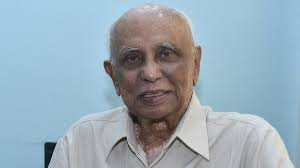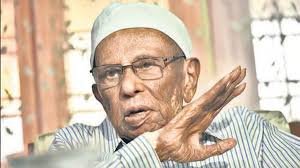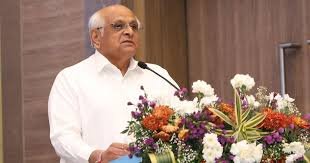Justice K.S. Puttaswamy: A Pillar in the Right to Privacy Case Passes Away at 98
Justice K.S. Puttaswamy, a revered figure in the Indian judiciary, passed away at the age of 98. He is best remembered for his pivotal role in the landmark Right to Privacy case, which profoundly influenced the legal landscape of India. Born in 1926, Puttaswamy’s career was marked by his unwavering commitment to justice and civil liberties, making him a prominent advocate for individual rights. He served as a judge in the Karnataka High Court and later held the position of a member of the State Human Rights Commission, where he fought tirelessly for human rights.
His Contribution to the Right to Privacy
Justice Puttaswamy’s most significant contribution was as the petitioner in the case that challenged the constitutional validity of the Aadhaar Act. His legal battle culminated in a historic Supreme Court judgment in 2017, which recognized the right to privacy as a fundamental right under Article 21 of the Constitution. This decision was a watershed moment in Indian jurisprudence, reinforcing the importance of privacy in the digital age. Puttaswamy’s advocacy emphasized that the state must respect individual privacy, ensuring that citizens’ personal information is safeguarded against arbitrary intrusions.
A Legacy of Judicial Excellence
Throughout his career, Justice Puttaswamy earned respect for his judicial integrity and wisdom. His judgments often reflected a deep understanding of constitutional values and the need for a robust framework to protect individual rights. He also participated in various legal reforms and initiatives aimed at enhancing human rights in India, inspiring many young lawyers and judges to follow in his footsteps. His passing leaves a significant void in the legal community, as he was a mentor and an inspiration to countless individuals in the field of law.
The Impact of His Passing
The demise of Justice Puttaswamy is not just a loss for his family and friends but for the entire nation. His contributions to the legal system will be remembered as pivotal in shaping modern India’s approach to privacy and human rights. As discussions around digital privacy and data protection continue to gain momentum, his legacy will serve as a guiding principle for future legal battles and reforms.

Why This News is Important
Significance of the Right to Privacy
The recognition of the right to privacy as a fundamental right is critical in today’s digital era, where data breaches and privacy invasions are rampant. Justice Puttaswamy’s work established a legal framework that empowers citizens to protect their personal information, making this issue more relevant than ever.
Judicial Legacy
Justice Puttaswamy’s legacy will influence future generations of lawyers and judges. His commitment to upholding constitutional values serves as a benchmark for aspiring legal professionals, highlighting the importance of integrity and human rights in the judiciary.
Continued Relevance of Privacy Issues
With the advent of technology, privacy concerns have escalated. The news of Justice Puttaswamy’s passing reignites discussions about the need for robust privacy laws and the ethical use of technology in India, ensuring that individuals are not subject to unwarranted surveillance.
Inspiration for Human Rights Activism
His life and work serve as an inspiration for human rights activists in India and beyond. Justice Puttaswamy’s relentless pursuit of justice highlights the critical role that individuals play in advocating for civil liberties and fighting against governmental overreach.
A Call to Action
The passing of such a pivotal figure is a call to action for lawmakers and citizens alike. It underscores the need to remain vigilant about personal rights and the role of the judiciary in protecting those rights in a rapidly changing world.
Historical Context
Justice K.S. Puttaswamy’s journey began in the backdrop of India’s evolving democracy, where the intersection of individual rights and state power has often been contentious. The Right to Privacy case emerged during a time of heightened concern regarding the implications of technological advancements and data collection by the state. The introduction of the Aadhaar scheme, which aimed to provide a unique identity to Indian citizens, raised alarms about potential misuse and invasion of privacy.
The Supreme Court’s 2017 judgment declaring the right to privacy a fundamental right was a significant turning point. It aligned India with global standards of privacy rights, emphasizing the need for a legal framework that protects citizens’ personal data. This case set a precedent for future legal battles regarding digital rights and personal freedom, affirming that privacy is intrinsic to the dignity of individuals in a democratic society.
Key Takeaways from Justice K.S. Puttaswamy’s Contributions
| S.No | Key Takeaway |
|---|---|
| 1 | Justice Puttaswamy was pivotal in the Right to Privacy case. |
| 2 | He recognized the right to privacy as a fundamental right under Article 21. |
| 3 | His legal battle against the Aadhaar Act influenced data protection laws in India. |
| 4 | He was a mentor and inspiration for many in the legal community. |
| 5 | His contributions will guide future discussions on privacy and human rights in India. |
Important FAQs for Students from this News
1. Who was Justice K.S. Puttaswamy?
Justice K.S. Puttaswamy was a prominent Indian judge known for his significant role in the landmark Right to Privacy case, which established privacy as a fundamental right under the Indian Constitution.
2. What was the outcome of the Right to Privacy case?
The Supreme Court of India recognized the right to privacy as a fundamental right under Article 21 of the Constitution in 2017, marking a crucial victory for individual rights and data protection.
3. How did Justice Puttaswamy contribute to human rights in India?
He was an advocate for civil liberties, serving on the Karnataka High Court and the State Human Rights Commission, where he pushed for reforms that protect individual rights.
4. What are the implications of the Right to Privacy judgment?
The judgment has profound implications for privacy laws in India, emphasizing the need for robust protections against state surveillance and misuse of personal data.
5. Why is Justice Puttaswamy’s legacy significant today?
His legacy is significant as it serves as a benchmark for future judicial decisions regarding privacy and civil liberties, inspiring new generations of legal professionals and human rights advocates.
Some Important Current Affairs Links


















